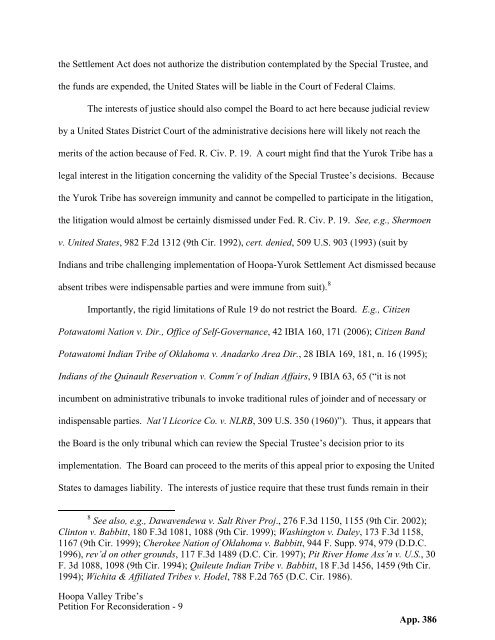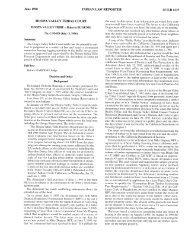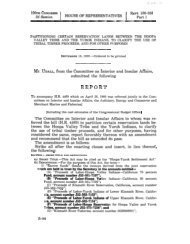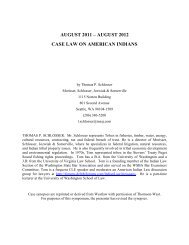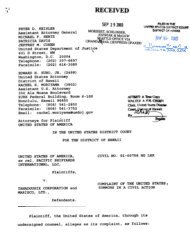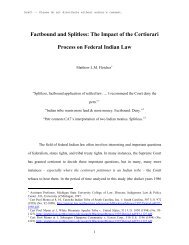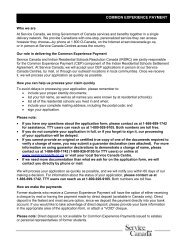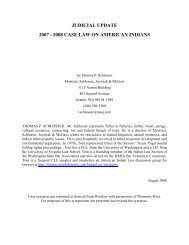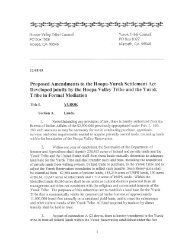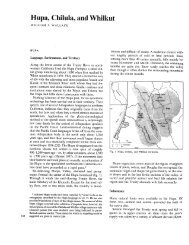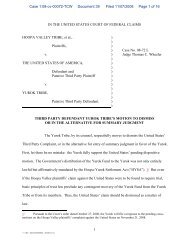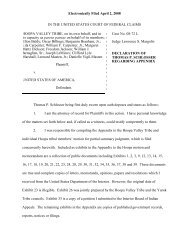Hoopa appendix supporting summary judgment - Schlosser Law Files
Hoopa appendix supporting summary judgment - Schlosser Law Files
Hoopa appendix supporting summary judgment - Schlosser Law Files
You also want an ePaper? Increase the reach of your titles
YUMPU automatically turns print PDFs into web optimized ePapers that Google loves.
the Settlement Act does not authorize the distribution contemplated by the Special Trustee, and<br />
the funds are expended, the United States will be liable in the Court of Federal Claims.<br />
The interests of justice should also compel the Board to act here because judicial review<br />
by a United States District Court of the administrative decisions here will likely not reach the<br />
merits of the action because of Fed. R. Civ. P. 19. A court might find that the Yurok Tribe has a<br />
legal interest in the litigation concerning the validity of the Special Trustee’s decisions. Because<br />
the Yurok Tribe has sovereign immunity and cannot be compelled to participate in the litigation,<br />
the litigation would almost be certainly dismissed under Fed. R. Civ. P. 19. See, e.g., Shermoen<br />
v. United States, 982 F.2d 1312 (9th Cir. 1992), cert. denied, 509 U.S. 903 (1993) (suit by<br />
Indians and tribe challenging implementation of <strong>Hoopa</strong>-Yurok Settlement Act dismissed because<br />
absent tribes were indispensable parties and were immune from suit). 8<br />
Importantly, the rigid limitations of Rule 19 do not restrict the Board. E.g., Citizen<br />
Potawatomi Nation v. Dir., Office of Self-Governance, 42 IBIA 160, 171 (2006); Citizen Band<br />
Potawatomi Indian Tribe of Oklahoma v. Anadarko Area Dir., 28 IBIA 169, 181, n. 16 (1995);<br />
Indians of the Quinault Reservation v. Comm’r of Indian Affairs, 9 IBIA 63, 65 (“it is not<br />
incumbent on administrative tribunals to invoke traditional rules of joinder and of necessary or<br />
indispensable parties. Nat’l Licorice Co. v. NLRB, 309 U.S. 350 (1960)”). Thus, it appears that<br />
the Board is the only tribunal which can review the Special Trustee’s decision prior to its<br />
implementation. The Board can proceed to the merits of this appeal prior to exposing the United<br />
States to damages liability. The interests of justice require that these trust funds remain in their<br />
8 See also, e.g., Dawavendewa v. Salt River Proj., 276 F.3d 1150, 1155 (9th Cir. 2002);<br />
Clinton v. Babbitt, 180 F.3d 1081, 1088 (9th Cir. 1999); Washington v. Daley, 173 F.3d 1158,<br />
1167 (9th Cir. 1999); Cherokee Nation of Oklahoma v. Babbitt, 944 F. Supp. 974, 979 (D.D.C.<br />
1996), rev’d on other grounds, 117 F.3d 1489 (D.C. Cir. 1997); Pit River Home Ass’n v. U.S., 30<br />
F. 3d 1088, 1098 (9th Cir. 1994); Quileute Indian Tribe v. Babbitt, 18 F.3d 1456, 1459 (9th Cir.<br />
1994); Wichita & Affiliated Tribes v. Hodel, 788 F.2d 765 (D.C. Cir. 1986).<br />
<strong>Hoopa</strong> Valley Tribe’s<br />
Petition For Reconsideration - 9


